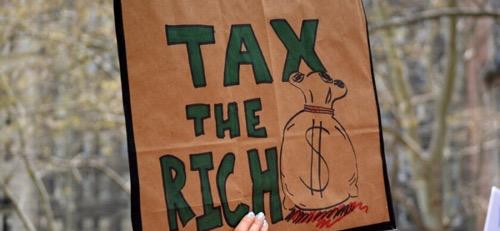
Recently, well-known e-commerce anchors have been recovered and fined 1.341 billion yuan for tax evasion and tax evasion, and the amount involved in the case is shocking, and people can't help but feel the disparity in income.
Many people want the more money in their bank accounts, the better, and the less taxes the better. But some young and wealthy Canadians want the federal government to tax them more.
01
Wealth Resources Movement
About 200 wealthy people between the ages of 18 and 40 formed an organization called the Resource Campaign to close the gap between rich and poor in Canada' population.
Members of the group also advocate two new taxes: a "wealth tax" on Canada's richest 10 percent and an inheritance tax on the top 10 on the wealth list. This will have a direct impact on themselves and their parents' bank accounts.
"Wealth taxes won't affect my life. So, why not implement it? Clare Trotier, from Montreal, said in an interview with Radio Canada, "If I had to give up part of my legacy, no one would feel sorry for me." ”
Since its inception in 2015, the resource movement organization has reallocated more than $450,000 in wealth to social justice groups through fundraising campaigns and, more recently, funded grassroots COVID-19 support organizations.
02
Levy of inheritance Tax Collection of wealth tax
Claire Trotier, 40, is currently a professor of microbiology and immunology at McGill University in Montreal and has a well-to-do family from an early age. Her father, Lorne Trottier, who co-founded the high-tech company Matrox, was ranked 38th on Canada's richest list in the late '90s, when Claire was attending high school at a private school.
"I know I'm very, very lucky." She said.
"I never had to worry about money. For example, if I can't afford to pay rent. My family is always able to provide a safe buffer that I can rely on. Because of this, some life choices that are difficult for other people are not difficult for me. ”
In 2000, her family founded the Trottier Family Foundation, which annually distributes charitable grants to the community. In 2018 alone, the foundation donated nearly $10 million to environmental, health and education programs.
But Terrotier said charitable donations alone are not enough.
"We consciously choose to dedicate part of our wealth to society. But there are a lot of families like us who don't make that choice," Trottier said, "and having a wealth tax is an effective way to ensure that social wealth is shared fairly by everyone." ”
The resource campaign prepares to launch a campaign against Canada's tax system before the federal budget was cancelled earlier this year due to the COVID-19 pandemic. In a video posted on the group's website and social media channels, members demanded that the government "impose a wealth tax" and "impose an inheritance tax."
According to a federal report, the top 10 percent of households on Canada's rich list own about 56.7 percent of Canada's wealth, totaling more than $6.6 trillion, released in June by the Office of budget officers in the Canadian Parliament.
By comparison, canada's bottom 40 percent of the population owns only about 1.1 percent of the wealth, or about $132 billion.
Members of the Resource Campaign say a wealth tax alone can bring in $9 billion a year and could fund the country's affordable housing programs, the national drug benefit program and dental care services for residents.
Daniel Hoyer, a member of the 38-year-old, said: "As a relatively wealthy member of the country, we know that there is a lot of wealth in Canada that is currently in the hands of a few people, but our country needs money and we can make the most of it. Daniel is a university lecturer in Toronto. His father was a restaurateur and cook; his mother was an accountant.
He believes that the government can avoid the crisis of public funds by imposing a wealth tax on all assets.
03
How to keep the balance of society in balance
Experts say rebalancing the wealth gap in society may seem simple, but it is difficult to achieve. Patrick LeBrond, a professor at the University of Ottawa's Graduate School of Public and International Affairs, is skeptical of the wealth tax move.
"'Taxing the rich' sounds good, but is it really the most effective measure for the government to redistribute wealth?" "Governments need to hire people to measure that, to travel all over the world, because often the richer people are, the better at hiding their assets," he said. ”
He suggested that other initiatives might be more effective, such as the fact that we could start with capital gains and apply the same criteria to tax all personal income.
On the one hand, under the existing tax system, only half of the profits (called capital gains) are taxable if a person has stocks or property in their name that are being sold. On the other hand, all people's wage income is taxable. LeBrund said the capital gains tax is lower than the wage income tax. This is the "financial advantage of the rich".
But some experts disagreed with the move, and others in power acknowledged its problems. The new Federal Finance Minister, ChristianIa Freeland, is one of them.
Before entering politics in 2012, Christia Freeland published The Rich: The Rise of the World's New Super-Rich and Other Classes Of Decline, which focused on the wealth gap between the wealthy and other classes.
But she did not comment on the proposal to impose a wealth and inheritance tax.
The Treasury Office noted that the government has decided to impose higher personal income taxes on the wealthy, while lowering the tax rate for the middle class and implementing child welfare funding. But there is still a long way to go to ensure that opportunity and wealth are fair to every Canadian.